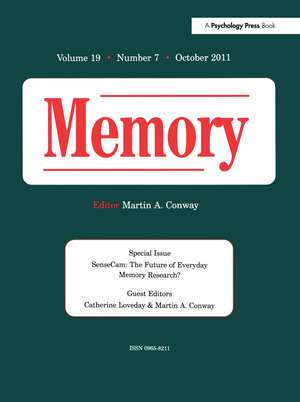SenseCam: The Future of Everyday Memory Research?: Special Issues of Memory
Editat de Catherine Loveday, Martin A. Conwayen Limba Engleză Paperback – 25 oct 2011
Preț: 289.66 lei
Preț vechi: 332.34 lei
-13% Nou
Puncte Express: 434
Preț estimativ în valută:
55.42€ • 57.87$ • 45.87£
55.42€ • 57.87$ • 45.87£
Comandă specială
Livrare economică 14-28 martie
Doresc să fiu notificat când acest titlu va fi disponibil:
Se trimite...
Preluare comenzi: 021 569.72.76
Specificații
ISBN-13: 9781848727533
ISBN-10: 1848727534
Pagini: 124
Dimensiuni: 210 x 280 x 6 mm
Greutate: 0.29 kg
Ediția:New.
Editura: Taylor & Francis
Colecția Psychology Press
Seria Special Issues of Memory
Locul publicării:Oxford, United Kingdom
ISBN-10: 1848727534
Pagini: 124
Dimensiuni: 210 x 280 x 6 mm
Greutate: 0.29 kg
Ediția:New.
Editura: Taylor & Francis
Colecția Psychology Press
Seria Special Issues of Memory
Locul publicării:Oxford, United Kingdom
Cuprins
Hodges, Berry, SenseCam: A Wearable Camera which Stimulates and Rehabilitates Autobiographical Memory. Loveday, Conway, Using SenseCam with an Amnesic Patient: Accessing Inaccessible Everyday Memories. Pauly-Takacs, SenseCam as a Rehabilitation Tool in a Child with Anterograde Amnesia. Browne, SenseCam Improves Memory for Recent Events and Quality of Life in a Patient with Memory Retrieval Difficulties. St-Jacques, Gender Differences in Autobiographical Memory for Everyday Events: Retrieval Elicited by SenseCam Images vs. Verbal Cues. Milton, An fMRI Study of Long-term Everyday Memory Using SenseCam. Brindley, Exploration of Use of SenseCam to Support Autobiographical Memory Retrieval within a Cognitive-Behavioural Therapeutic Intervention. Barnard, Exploring the Basis and Boundary Conditions of SenseCam-facilitated Rehabilitation. Murphy, SenseCam, Imagery and Bias in Memory for Wellbeing. Burke, Passive Imaging Technology in Aphasia Therapy. Doherty, Automatically Assisting Human Memory: A SenseCam Browser.
Descriere
This special issue is the first collection of preliminary reports using advanced camera technology, the SenseCam, to study and rehabilitate everyday memory in ways not previously possible. This set of preliminary reports from established memory researchers and clinicians uses a series of group and case studies to evaluate the greater potential of this new technology in investigating and improving memory for everyday experiences.









